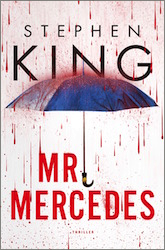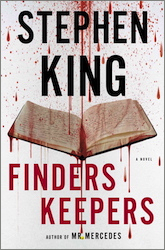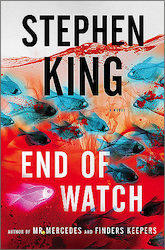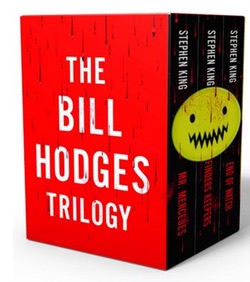Stephen King loves crime fiction. His first completed novel, Rage, was about a kid holding his high school class at gunpoint, and the novel he wrote right before Carrie was Blaze, the story of a kidnapping gone wrong. Several of his early short stories were crime stories (“Stud City,” 1969; “The Fifth Quarter,” 1972) and when he gave his speech accepting the National Book Award in 2003, he singled out for praise a handful of authors he believed were deserving of more attention, most of them crime and thriller novelists like Elmore Leonard, John Grisham, Mary Higgins Clark, and Michael Connelly.
Richard Branson wants to be an astronaut and so he built a spaceport in New Mexico. Stephen King wants to be a crime novelist, and so he published his Bill Hodges Trilogy: Mr. Mercedes (2014), Finders Keepers (2015), and End of Watch (2016). If there’s one thing that we, as Americans, will die to defend, it’s the inalienable right of every rich person to live their dreams, and the first book in the trilogy, Mr. Mercedes, even won the coveted Edgar Award for Best Novel from the Mystery Writers of America. So now Stephen King is a crime writer, and god bless America. The only problem is, he’s not a very good one.
For decades, book critics were content to punch Stephen King in the stomach as they walked past him on their way to hang out at Philip Roth’s parties. The thinking was that, yes, they were ignoring one of the most popular writers in America, but he had giant piles of money to mop up his tiny teardrops. “You can have money or respect, King!” they sneered as they gave him atomic wedgies. “But you’re not getting both!” Then Stephen King won the National Book Award, and critics started to think, “Maybe belittling a guy who’s sold a few hundred million books makes us look petty?” Now they wildly overpraise him. He is “America’s greatest natural storyteller,” and “one of America’s finest writers,” and “a rhapsode in the ancient mould” according to the reviews for Mr. Mercedes.
Mr. Mercedes kicks off with a scene so compelling that it echoes through all three books: desperate people wait on line in a parking lot for a job fair to begin so they can throw themselves on the mercy of potential employers. As the line of recession victims grows longer, a lunatic drives a Mercedes-Benz into the crowd and kills eight people, injures dozens more, then zooms away. The police are not only impressed by the killer’s knack for symbolism, but also by the fact that they can’t catch him. It’s a great scene, and Mr. Mercedes definitely starts off by putting its best foot forward. Unfortunately, that’s its only foot.
Cut to: a couple of years later and Bill Hodges, the detective on the case, is retired and putting his gun in his mouth a lot because that’s what retired cops do in books like this. But then the Mercedes Killer sends Bill a taunting letter and Bill realizes that he must regain his dignity, lose weight, and solve the crime or he is not the lead character in a crime series.
 By page 42, we’ve met the Mercedes Killer, Brady Hartsfield—and if you thought Bill Hodges was a cliché, wait until you see this guy. Hartsfield is Norman Bates 2.0, working in an electronics store, living with his mother, having sex with his mother, and driving an ice cream truck. He’s also a racist. The only thing he doesn’t do is dress up as a scary clown and drown kittens. The rest of the book is a race against time between Hodges and Hartsfield as the former Mercedes Killer decides to commit one more crime because that’s what crazy killers do in books like this.
By page 42, we’ve met the Mercedes Killer, Brady Hartsfield—and if you thought Bill Hodges was a cliché, wait until you see this guy. Hartsfield is Norman Bates 2.0, working in an electronics store, living with his mother, having sex with his mother, and driving an ice cream truck. He’s also a racist. The only thing he doesn’t do is dress up as a scary clown and drown kittens. The rest of the book is a race against time between Hodges and Hartsfield as the former Mercedes Killer decides to commit one more crime because that’s what crazy killers do in books like this.
And that’s this series in a nutshell: characters and incidents lifted from other books and reassembled into a passable but hardly compelling collage. From Ed McBain, King has taken the nameless city in which his book is set. From Robert Bloch he’s taken Norman Bates and turned him into Brady Hartsfield. From Stieg Larsson he’s taken the dysfunctional genius computer hacker and given her to Hodges as a sidekick in the character of Holly Gibney, a middle-aged computer genius in the body of a teenaged girl who’s one of those super-powered autistic people Hollywood loves. From The Cosby Show he takes Theo Huxtable and gives us Jerome, a loyal and brave African-American teen given to hijinks and outbursts of Stepin Fetchit dialect.
There’s also a love interest in Mr. Mercedes, in the form of a sexy sister of a former suspect who happens to have a thing for middle-aged, out-of-shape ex-cops, although within four pages of her first appearance you can see King measuring her to make sure she fits the refrigerator he plans on stuffing her into later. All told, Mr. Mercedes is a book about a cliché, hunting an even more blatant cliché, while assisted by a series of clichés.
But King hasn’t written close to 70 novels for nothing. His voice is easy on the ears, he makes even the rehashing of clues pass painlessly, and he’s able to efficiently summon a sterile McMansion or a cheap Italian restaurant in the wrong part of town with a handful of telling details. Things move quickly, and King gooses the plot along with outrageous coincidences whenever it starts to get boring, but that’s like saying, “My husband isn’t as ugly as his brothers, and he’s never tried to kill me in my sleep.” It’s pretty faint praise.
 Debuting at number one on the New York Times bestseller list, Mr. Mercedes dropped out of the top ten after eight weeks, and fell off the list entirely after eleven weeks, a little under par for a Stephen King novel these days, most of which hang on in the top ten for at least ten weeks. It’s better than the sequel, Finders Keepers, which debuted at number one, dropped out of the top ten a week earlier, and fell off the list entirely at ten weeks. That may be because it’s an even less substantial book than Mr. Mercedes.
Debuting at number one on the New York Times bestseller list, Mr. Mercedes dropped out of the top ten after eight weeks, and fell off the list entirely after eleven weeks, a little under par for a Stephen King novel these days, most of which hang on in the top ten for at least ten weeks. It’s better than the sequel, Finders Keepers, which debuted at number one, dropped out of the top ten a week earlier, and fell off the list entirely at ten weeks. That may be because it’s an even less substantial book than Mr. Mercedes.
Without the bravura opening of the first book, Finders Keepers has Bill Hodges, Jerome, and Holly forming a detective agency called Finders Keepers, and this time they’re on the trail of a killer who’s obsessed with the notebooks he stole from a reclusive writer named John Rothstein back in 1978. Rothstein became the voice of his generation with his character Jimmy Gold, who’s given to catchphrases like “Shit don’t mean shit.” The killer, Morris Bellamy, murdered Rothstein in a bungled robbery, stole his cash and his notebooks (he’s his number one fan) before going to prison for unrelated crimes. While he’s in the clink, a little kid found the notebooks and cash and also became obsessed with Jimmy Gold, then Bellamy gets out of the slammer and Hodges and the whole Scooby gang have to rescue the kid from his clutches.
Rothstein is basically J.D. Salinger crossed with John Updike and most of the characters in the book feel similarly cut and pasted. The language is uncharacteristically second-hand and clunky. One chapter ends with, “Pete lay awake for a long time that night. Not long after, he made the biggest mistake of his life.” Not only is “the biggest mistake of his life” a phrase so worn out it’s practically meaningless, but that repeated “long” is the kind of sloppiness that’s not at all like King. In a literary Hail Mary, the book ends with the comatose Brady Hartsfield reappearing and displaying previously unknown psychic powers.
 And so we come to the generically titled End of Watch, published in 2016 and originally called The Suicide Prince, which is far more evocative. Hartsfield has developed psychic powers because his evil doctor is experimenting on him with an untested drug that’s given him psychic superpowers. Bill Hodges has pancreatic cancer and hides his terminal diagnosis from everyone. A videogame controls people’s minds and makes them kill themselves. As Hartsfield masterminds a complicated and awkward revenge plan we get to deal with some of the most hackneyed writing of King’s career. Holly is someone who “thinks outside the box, sometimes way outside it” and her eyes are “beautiful and full of intelligence”. Hartsfield develops a phantom hand like the main character in Duma Key, he uses incontinence as a form of revenge against his caretakers, as in Dolores Claiborne, and the people he psychically manipulates become dirty and unkempt, like the people “pushed” by Andy McGee in Firestarter. Characterization is inconsistent (cops go behind their partner’s backs and then give lectures on partner loyalty) and previously undisclosed evidence pops up as needed.
And so we come to the generically titled End of Watch, published in 2016 and originally called The Suicide Prince, which is far more evocative. Hartsfield has developed psychic powers because his evil doctor is experimenting on him with an untested drug that’s given him psychic superpowers. Bill Hodges has pancreatic cancer and hides his terminal diagnosis from everyone. A videogame controls people’s minds and makes them kill themselves. As Hartsfield masterminds a complicated and awkward revenge plan we get to deal with some of the most hackneyed writing of King’s career. Holly is someone who “thinks outside the box, sometimes way outside it” and her eyes are “beautiful and full of intelligence”. Hartsfield develops a phantom hand like the main character in Duma Key, he uses incontinence as a form of revenge against his caretakers, as in Dolores Claiborne, and the people he psychically manipulates become dirty and unkempt, like the people “pushed” by Andy McGee in Firestarter. Characterization is inconsistent (cops go behind their partner’s backs and then give lectures on partner loyalty) and previously undisclosed evidence pops up as needed.
King’s written about aging and dying a lot in his recent books, and the most interesting parts of this trilogy revolve around Hodges’s mortality. But ultimately, detective fiction doesn’t feel like a fit for King, maybe because plot has never been his strong suit and detective novels are largely plot-driven. He’s always been far more interested in character, and that may account for why this trilogy feels so clunky in his hands. Or it may be because King was a fan of crime fiction first and, like Annie Wilkes in Misery, fans don’t necessarily make the best writers. Either way, EOW debuted at number one on the New York Times bestseller list and stayed there for three weeks, the only book in the series to hold the top spot for more than a week. But it dropped off the list just as quickly as the others, falling out of the top ten after nine weeks, and disappearing from the list altogether by week eleven. And that’s what these books do, too. They hang around in your mind while you read them and then, a few weeks later, you try to remember the details but *poof* they’re gone.
This article is adapted from an earlier review of Mr. Mercedes, originally published in June 2014.
Grady Hendrix is the author of Paperbacks from Hell, a history of the horror paperback boom of the Seventies and Eighties, as well as My Best Friend’s Exorcism, and Horrorstör.











A book that fell off the best-seller lists before it debuted? Now there’s a story worthy of being a King novel!
You’re some sort of genius, Grady.
Fantastic write-up! I agree completely. I’ve been baffled by some of the reviews I’ve read that casually mentioned Jerome’s “Stepin Fetchit” persona as mildly offensive. Thats putting it lightly! To me it derailed the entire series. Only an out of touch white guy in his 70’s could possibly think this was funny. There’s ZERO chance an actual black kid in his 20’s would find it amusing, especially in this day & age. Even the white characters seem annoyed by it, which just adds insult to injury -making Jerome offensive, out of touch AND unfunny to everyone. I can’t believe King’s own kids (both good writers) didn’t beg him to cut that out: “Hey Pop? I know you’ve sold a bajillion books and all but let me tell you how society has changed since the 1950’s.” Then again, MY dad sure doesn’t listen to my advice………
Your review has actually made me want to read the trilogy. It sounds bad enough to be good. Maybe King intended to write a detective story riddled with cliches? King’s worst novel is better than most writer’s best so I wouldn’t knock him too much. The interesting thing about critiques is that the view point is completely subjective. Perhaps you just didn’t get it? A while back there was an article that argued that Robert Jordan was America’s Tolkien, I would argue that sai King holds that title (IMHO). He has his faults but in 100 hundred years when future generations are studying the literature of the late 20th, early 21st centuries Mr. King will absolutely be a part of the syllabus. Reviews from hell from Mr. Grady?
I enjoyed the series. Not King’s best work, but decent enough. Hodges is a worthy, believable protagonist. Your critique of Brady Hartsfield is weak sauce–King has PLENTY of villains who are more cliched and unbelievably evil. Your preconceptions of this series’s marketed genre unduly influenced your critique, which leads me to wonder if this had been marketed as straight horror, what your review would have been like.
I don’t know if I agree with Grady’s claim that detective fiction is about plot, I mean ok some of it probably is, but I don’t think one reads Connelly’s Bosch novels for the mysteries, or Block’s Scudder novels for whatever Matt got himself sucked into or Westlake’s Parker novels for the mechanics of Parker latest job (don’t get me even started on Elmore Leonard), I mention those names because those are crime writers King is known for praising and they are all about world, character and voice.
I do agree that on those terms, the Hodges books fall a good deal short than the masters King is aiming for. King is very good at character but he always had a tendency to write flat leading men who everyone else can bounce off to (something Grady deal very well through this series) and Hodges is very much on that tradition, his failures doesn’t really hunt him quite the way Scudder’s does nor his certainties pop up off the page like Bosch’s does (to get two crime detective leads I mentioned above), he gets more interesting as the series goes along because of the shadow of his demise. His more intriguing quality is that if King’s leads have grown older as this reread has point out, he was the first real old guy lead King wrote after he got old himself.That kind of leading man really isn’t very well suited to the sort of crime fiction King aims for. He is a nice enough presence to follow throughout the books, but never going beyond that.
The series is often stronger the closer they are to outright horror/thriller. I actually think Finders Keepers is the best one, because it is really a thriller about two people obsessed with someone else work than it is a Hodges book, he is nearly complete incidental to the plot and I think the material works because it is the kind of thing that haunts King. Yes, the books are what if Holden Caulfied starred in the Rabbitt series, but I don’t think one can really write those big man of letters tales without a little of that shorthand and Salinger/Upidke mix makes sense for one starring a teenager. Yet the specifics of the obsession are pure King and they sting.
Just a reminder to keep the discussion civil and keep your comments/criticisms focused on the books in question, not on individual people.
Mate your own review has an unmistakable undertone of pettiness, cliche (ironically) and sounds like you’re going out of your way to make the series sound bad rather than just appreciate the simple brilliance of it. Whilst not Kings best work admittably it’s still fast paced and captures the audiences interest with a plot that is simple but with plenty of suspense that keeps you reading. The characters are interesting, and the so called cliches well I think they make the character all the more believable and relatable. I especially like that he gave a voice and insight into book the protagonist and antagonist. I would read the series over again and still enjoy it.
Regarding the first book:
I’ll agree with the part about the cliches, reading the first novel, I did think to myself several times that Brady Hartsfield was the “stereotypical psychopath killer that sleeps with his mom”, and Bill Hodges did seem to be “cookie cutter cop who misses fighting bad guys”, but there’s one thing you got wrong: Jerome was the computer genius, not Holly.
Personally, I didn’t read the second book because it wasn’t at the library, so I have no idea. I also didn’t know it existed, but I didn’t need to get it to understand the third book.
As for the third book:
The point about the focus on his morality was correct. There was a large amount of “oh look I’m about to die better hurry up and figure out why everyone’s killing themselves” in that one. But out of the two I’ve read, the third one strikes me as the most Stephen King-esque of all of them. An evil man is suddenly in possession of psychic powers and uses them to wreak havoc on the failed victims of his previous crime, and goad them into suicide? Sounds like a Stephen King book to me! Personally, out of the three, I enjoyed this one best, because it was exactly the right balance of supernatural elements and human activity that I enjoy.
I am certainly no literary expert and I can see the cliches you mention. I’d agree it’s not his best work, but it makes for an exciting audiobook while driving to work. Perhaps my tastes are simple and I guess then it makes sense that I would enjoy this kind of modern “pulp”. I suppose it only matters to me since it is pleasing to me to read.
I really enjoyed these novels. Some of the interactions between Bill and Jerome are indeed painful to sit though but generally the characters are all great and they are fun supernatural horror thrillers. Holly Gibney is an especially compelling character.